Accommodation · Asia · Attractions · Cambodia · Going Out · Hotels · Regions
Ethical elephant tourism in Cambodia
As tourist numbers grow in Cambodia the number of elephant ‘sanctuaries’ is also on the increase. Understandably, people want to experience these majestic creatures in their natural habitat but as their numbers reduce this is becoming more and more difficult.
The death of an elephant that was being used to offer tourists the ‘once-in-a-lifetime’ opportunity to ride an elephant within the Angkor Wat complex received huge media attention worldwide, as people were rightly outraged that this had happened. Sadly, nothing has changed at Angkor Wat; more than a year later the same company are offering the same experience to tourists that really should know better. All the time that the demand is there from tourists to ride elephants, there will be an organisation willing to exploit these beautiful creatures.
Quite simply, we should never ride elephants or support any project or organisation that offers this experience. If it is not possible to see wild elephants in their ever dwindling natural habitat, then visiting an ethical elephant sanctuary is the best option.
Elephant Valley Project has been operating in Mondulkiri since 2006 and was the first true elephant sanctuary in Cambodia. As a registered NGO they have worked tirelessly to protect the environment from rapid deforestation whilst at the same time providing a space for elephants to live with independence and dignity.
 Asian elephants are an endangered species and without protection their numbers will continue to shrink. There are only an estimated 500 wild elephants in Cambodia of which around 300 are in Mondulkiri with others living in Preah Vihear and the Cardamom Mountains. Therefore organisations such as Elephant Valley Project are essential to their future.
You won’t find any swimming with elephants, riding elephants or feeding elephants here but you will have the chance to observe these beautiful creatures from a respectful distance, knowing that your donation from volunteeering is going to a very good cause. Not only does your money fund the elephant care and treatment but it will be used to protect the forest and for various community support initiatives including healthcare and education.
#letthemroamfree
Asian elephants are an endangered species and without protection their numbers will continue to shrink. There are only an estimated 500 wild elephants in Cambodia of which around 300 are in Mondulkiri with others living in Preah Vihear and the Cardamom Mountains. Therefore organisations such as Elephant Valley Project are essential to their future.
You won’t find any swimming with elephants, riding elephants or feeding elephants here but you will have the chance to observe these beautiful creatures from a respectful distance, knowing that your donation from volunteeering is going to a very good cause. Not only does your money fund the elephant care and treatment but it will be used to protect the forest and for various community support initiatives including healthcare and education.
#letthemroamfree
 Mondulkiri is a province in the East of Cambodia, on the border with Vietnam. It is a 6 hour drive from the capital city of Phnom Penh and around 9 hours from Siem Reap, the home of Angkor Wat. So after a few days (or more) volunteering at Elephant Valley Project what better than to check into a luxury hotel for some rest and relaxation?
On the outskirts of Siem Reap, just a few kilometers from Angkot Wat and set within pristine grounds is Templation, a true oasis and the perfect place to recharge your batteries. With 41 stylish suites and villas to choose from, some boasting their own private pool check in here for the ultimate in luxury and enjoy the first rate service.
Mondulkiri is a province in the East of Cambodia, on the border with Vietnam. It is a 6 hour drive from the capital city of Phnom Penh and around 9 hours from Siem Reap, the home of Angkor Wat. So after a few days (or more) volunteering at Elephant Valley Project what better than to check into a luxury hotel for some rest and relaxation?
On the outskirts of Siem Reap, just a few kilometers from Angkot Wat and set within pristine grounds is Templation, a true oasis and the perfect place to recharge your batteries. With 41 stylish suites and villas to choose from, some boasting their own private pool check in here for the ultimate in luxury and enjoy the first rate service.

 In the centre of Phnom Penh and adjacent to the Royal Palace is Pavilion, a luxury hotel housed in 4 period buildings with rich architectural heritage. Offering 36 rooms and suites including Private Pool Suites and Jacuzzi Bungalows guests can be sure to find something that suits their needs and enjoy peace and tranquility at the end of their Cambodian adventure.
In the centre of Phnom Penh and adjacent to the Royal Palace is Pavilion, a luxury hotel housed in 4 period buildings with rich architectural heritage. Offering 36 rooms and suites including Private Pool Suites and Jacuzzi Bungalows guests can be sure to find something that suits their needs and enjoy peace and tranquility at the end of their Cambodian adventure.

 Cambodia has so much to offer and it is great to know that ethical elephant tourism is truly alive and kicking in the Kingdom. We love to visit and support projects that have protecting the environment and wildlife at their core. When this is combined with a little luxury too then that makes for a perfect trip, so ending our trip at one of these luxury hotels seemed like a wonderful way to end our most recent Cambodian adventure!
Paul Eyers is Founder of Vegan Food Quest. Vegan Food Quest have become luxury vegan travel specialists as they continue to find, eat and write about the best vegan food in the world.
If you would like to be a guest blogger on A Luxury Travel Blog in order to raise your profile, please contact us.
Cambodia has so much to offer and it is great to know that ethical elephant tourism is truly alive and kicking in the Kingdom. We love to visit and support projects that have protecting the environment and wildlife at their core. When this is combined with a little luxury too then that makes for a perfect trip, so ending our trip at one of these luxury hotels seemed like a wonderful way to end our most recent Cambodian adventure!
Paul Eyers is Founder of Vegan Food Quest. Vegan Food Quest have become luxury vegan travel specialists as they continue to find, eat and write about the best vegan food in the world.
If you would like to be a guest blogger on A Luxury Travel Blog in order to raise your profile, please contact us.
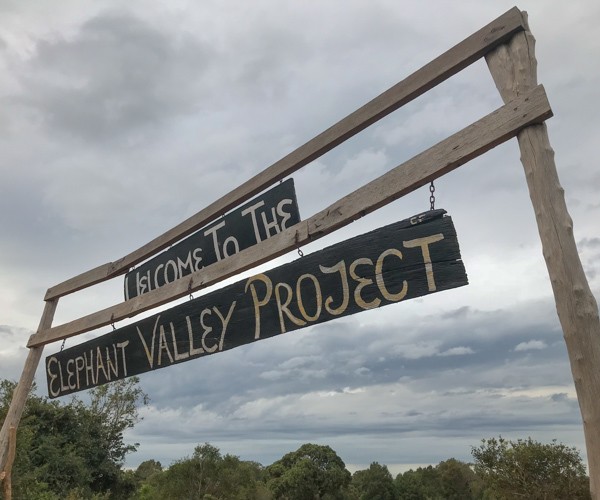 Asian elephants are an endangered species and without protection their numbers will continue to shrink. There are only an estimated 500 wild elephants in Cambodia of which around 300 are in Mondulkiri with others living in Preah Vihear and the Cardamom Mountains. Therefore organisations such as Elephant Valley Project are essential to their future.
You won’t find any swimming with elephants, riding elephants or feeding elephants here but you will have the chance to observe these beautiful creatures from a respectful distance, knowing that your donation from volunteeering is going to a very good cause. Not only does your money fund the elephant care and treatment but it will be used to protect the forest and for various community support initiatives including healthcare and education.
#letthemroamfree
Asian elephants are an endangered species and without protection their numbers will continue to shrink. There are only an estimated 500 wild elephants in Cambodia of which around 300 are in Mondulkiri with others living in Preah Vihear and the Cardamom Mountains. Therefore organisations such as Elephant Valley Project are essential to their future.
You won’t find any swimming with elephants, riding elephants or feeding elephants here but you will have the chance to observe these beautiful creatures from a respectful distance, knowing that your donation from volunteeering is going to a very good cause. Not only does your money fund the elephant care and treatment but it will be used to protect the forest and for various community support initiatives including healthcare and education.
#letthemroamfree
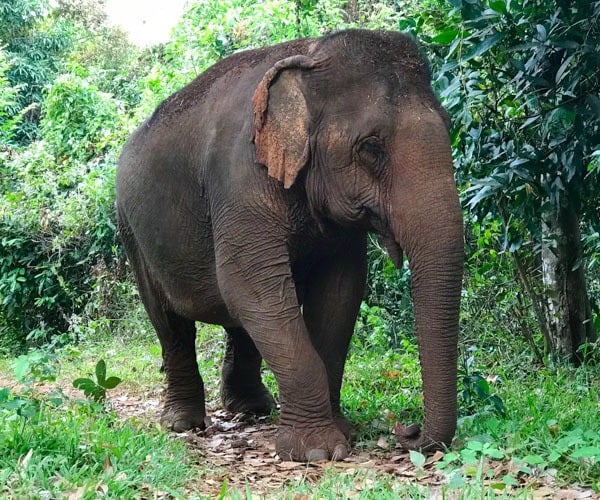 Mondulkiri is a province in the East of Cambodia, on the border with Vietnam. It is a 6 hour drive from the capital city of Phnom Penh and around 9 hours from Siem Reap, the home of Angkor Wat. So after a few days (or more) volunteering at Elephant Valley Project what better than to check into a luxury hotel for some rest and relaxation?
On the outskirts of Siem Reap, just a few kilometers from Angkot Wat and set within pristine grounds is Templation, a true oasis and the perfect place to recharge your batteries. With 41 stylish suites and villas to choose from, some boasting their own private pool check in here for the ultimate in luxury and enjoy the first rate service.
Mondulkiri is a province in the East of Cambodia, on the border with Vietnam. It is a 6 hour drive from the capital city of Phnom Penh and around 9 hours from Siem Reap, the home of Angkor Wat. So after a few days (or more) volunteering at Elephant Valley Project what better than to check into a luxury hotel for some rest and relaxation?
On the outskirts of Siem Reap, just a few kilometers from Angkot Wat and set within pristine grounds is Templation, a true oasis and the perfect place to recharge your batteries. With 41 stylish suites and villas to choose from, some boasting their own private pool check in here for the ultimate in luxury and enjoy the first rate service.
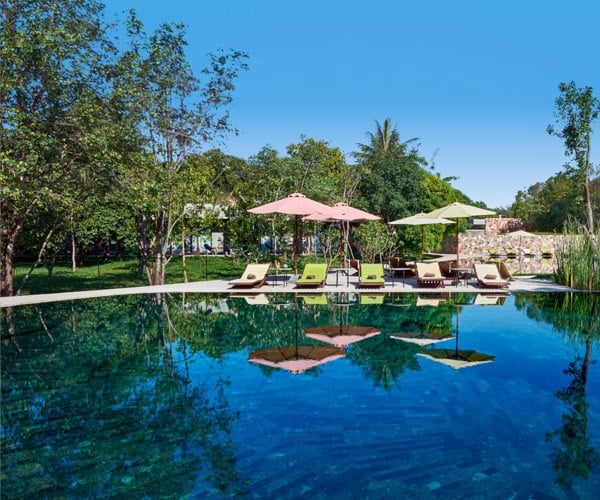
 In the centre of Phnom Penh and adjacent to the Royal Palace is Pavilion, a luxury hotel housed in 4 period buildings with rich architectural heritage. Offering 36 rooms and suites including Private Pool Suites and Jacuzzi Bungalows guests can be sure to find something that suits their needs and enjoy peace and tranquility at the end of their Cambodian adventure.
In the centre of Phnom Penh and adjacent to the Royal Palace is Pavilion, a luxury hotel housed in 4 period buildings with rich architectural heritage. Offering 36 rooms and suites including Private Pool Suites and Jacuzzi Bungalows guests can be sure to find something that suits their needs and enjoy peace and tranquility at the end of their Cambodian adventure.
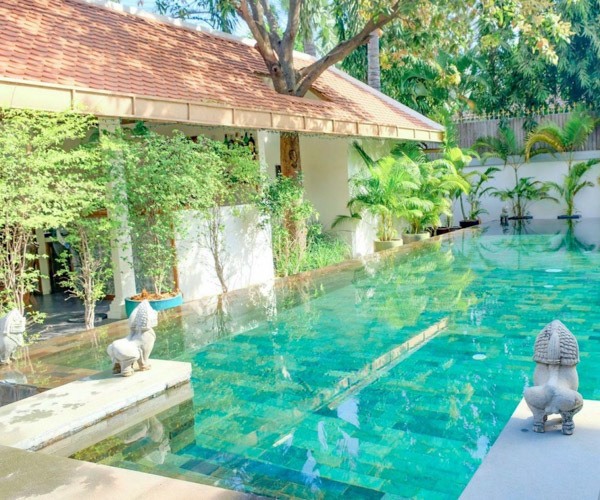
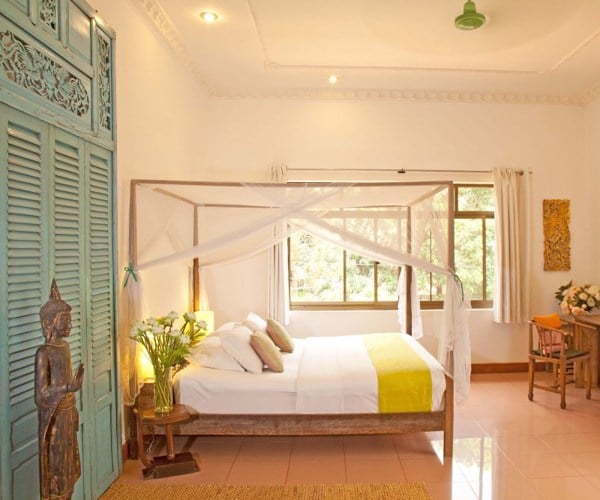 Cambodia has so much to offer and it is great to know that ethical elephant tourism is truly alive and kicking in the Kingdom. We love to visit and support projects that have protecting the environment and wildlife at their core. When this is combined with a little luxury too then that makes for a perfect trip, so ending our trip at one of these luxury hotels seemed like a wonderful way to end our most recent Cambodian adventure!
Paul Eyers is Founder of Vegan Food Quest. Vegan Food Quest have become luxury vegan travel specialists as they continue to find, eat and write about the best vegan food in the world.
If you would like to be a guest blogger on A Luxury Travel Blog in order to raise your profile, please contact us.
Cambodia has so much to offer and it is great to know that ethical elephant tourism is truly alive and kicking in the Kingdom. We love to visit and support projects that have protecting the environment and wildlife at their core. When this is combined with a little luxury too then that makes for a perfect trip, so ending our trip at one of these luxury hotels seemed like a wonderful way to end our most recent Cambodian adventure!
Paul Eyers is Founder of Vegan Food Quest. Vegan Food Quest have become luxury vegan travel specialists as they continue to find, eat and write about the best vegan food in the world.
If you would like to be a guest blogger on A Luxury Travel Blog in order to raise your profile, please contact us.Did you enjoy this article?
Receive similar content direct to your inbox.


I live in Cambodia and it is good to see organisations that work hard to protect the wild animals. Would love to visit Mondulkiri one day.
You should visit Mondulkiri for sure. It is a beautiful part of Cambodia!
Great article to raise awareness. I must say out of the 4 days we were at Angkor Wat no one was riding the elephants – they were being walked through the ground but no one was riding them. So I do think that tourism is changing.
On a different note I wanted to point out that just stopping the riding and not supporting the businesses is not a fix. In Thailand espesially there is a huge problem with businesses that used to rely on elephant tourism, because now that everyone just stopped, they can’t afford to feed them (and as you know they eat a lot). So as a result they are letting the tamed elephants loose into the wild to fend for themselves and they are dying of starvation. So it has created a new problem – not sure if that was the case for Cambodia.
Just wanted to point out there is no quick fix unfortunately :( Just wanted to make people aware that there is a sad side to ‘not riding’ as well unfortunately.
Hi Jolene
Thank you for your thought provoking comments!
Firstly let me say you are correct that there is never a ‘quick fix’ for many problems and elephant tourism is one of them.
The situation in Cambodia is complex as I’m sure it is elsewhere. The elephants have a huge price on their head as luxury hotels and organisations (such as Safari World Phnom Penh) still wish to buy them. Therefore, alongside their natural habitat being decimated by logging and construction the biggest risk for the elephants is being sold to an owner who cannot possibly look after them.
Therefore, organisations such as EVP offer an alternative to owners by allowing the elephants to live with them in their later years.
But as you said, there is no quick fix…
Regarding elephant riding at Angkor Way you were very lucky not to see them with tourists on their backs. I live just 5 minutes from the temples and can assure you that it happens every day. The elephants are owned by a hotel and they sell these elephant riding experiences to their guests and other guests from around the wworld. It is still a very lucrative operation and just so sad that despite all of the negative media attention that this till happens.
Kind regards,
Paul.
I am not surprised that people from a country like Cambodia still mistreat animals as they do not have the education to know it’s wrong. They also are doing what they can in a difficult environment to earn a crust.
It’s really down to the tourists and expats to provide education and help them find another way of life for these guys.
Hi Terry,
As education improves and knowledge increases this will change. It will be a slow change but it will change for sure. Not so many years ago we still thought circus with animals / Sealife / riding elephnats was cool but we now know better.
And that’s what upsets me, we have the knowledge yet we still don’t change. Every day there are people riding elephants at Angkor Wat and they are all educated tourists that should know better.
So annoying and so upsetting…
Paul
When we visited Thailand we done lots of research to try and find an ethical way to see elephants. There are so many options and many of them not good at all. Elephant Valley Project sounds great so we will consider this when we come to Cambodia.
Thanks for your comment Jamie. We were impressed with EVP and they certainly seem to be doing the ‘right thing’ and making a positive impact.
Pleased to read that there are conservation efforts being made to protect Cambodia’s true and living natural heritage. Although ‘domesticated’ elephants have been common for centuries, we live in more informed times. The hideous mistreatment involved in taming these magnificent creatures is increasingly common knowledge. I hope Cambodia can lead the way in honouring the animals themselves, and shy away from practises tainted by unneccessary abuse. This is impertative for the future of enlightened tourism.
Thank you Sam for your comments.
I love the term ‘enlightened tourism’ and it is our responsibility as those that have the knowledge to spread the word and do all we can to end tourism that uses and abuses animals…
Paul
Really enjoyed your review of Elephant Valley Project. As a result I looked at their website and can see that, as you, say, it is a project worth supporting. Unfortunately, that does depend on ‘tourists’, whether as volunteers or visitors. Without their financial support the project could not continue. Of course, it is all about trying to increase awareness and achieve a balance between what’s best for the elephants whilst recognising it is a much more complex issue. I visited Ankgor Wat 20 years ago and I rode on an elephant and thought it was wonderful experience. It makes me feel really sad that it may have been on one of the elephants now at EVP. Or maybe I should feel happy that she is now happy in retirement, as I am. We all learn and change our attitudes and behaviour accordingly. Thank you for your part in raising awareness.
What a contrast to then read your reviews of luxury resorts in Siem Reap and Phnom Penh, both of which look amazing. Again, the future of tourism in Cambodia is about achieving balance. The hotels and resorts you review seem to share similar philosophy and an ethical and environmentally sound approach. (and they don’t include elephant riding or swimming with dolphins)
eileen
Thanks for your comments Eileen.
The future of tourism is indeed all about achieving balance. At the same time education and raising awareness need to be ongoing and never ending in an effort to promote responsible tourism.
EVP do a great job in a very tough environment and themsleves are constantly challenged with the complexities of the secor they operate in.
Regarding the hotels, it is so good to see more and more luxury hotels and resorts offering vegan food and removing plastic water bottles. Both of these simple changes make a huge impact that continues to grow as others follow suit…
Paul
Really interesting story to read about elephant…will surely visit this place…
I hope you get the chance to visit the elephants at EVP one day as it was a wonderful and thought provoking experience. It was also great to support such a good cause.
Excellent piece.
As stated in the comments above, it is an incredibly complex situation for all countries that have captive and wild elephants. Each one facing many of the same and unique challenges.
With Cambodia’s long history of elephants working in captivity and so steeped in the countries culture, elephants will always play a part in the the identity of Cambodia.
The problems faced must be addressed on many fronts, not only educating the vast number of tourists that come into the kingdom wanting to see these magnificent animals. Not to mention highlighting these issues with the people of Cambodia. Working closely with the owners of elephants, be they from a small village in Mondulkiri province or out in Siem Reap/Phnom Penh must also be a top priority in order to move the whole industry forward.
Thank you for your detailed comment Chris it is much appreciated…
You mention “problems faced must be addressed on many fronts” and this is so true. Everyone from tourists to the government have a responsibility that they must take seriously.
Let’s hope things can move in the right direction and leave Cambodia and EVP at the forefront of ethical animal tourism by setting an example to others.
It was really sad to see another elephant die at Angkor Wat – totally shocking. Its such a shame that people still fall for these kind of ‘tourist traps’ but the more people educated on the damage it can do, the better.
I still haven’t been to Mondulkiri and I’m not sure I ever will as its so far away but it’s great to see elephants being respected in their own environment. Elephants are my favourite animal and they deserve as much freedom as we do.
Thanks for the information as always. Great to read what you have been up to.
Thank you for your comment Jodie. The road to Mondulkiri is now far better than in the past so although it’s a long journey it wasn’t too bad! We were pleased to finally get there…
I was with my girlfriend in Cambodia last year. We were lucky enough to visit Phnom Penh (from Ho Chi Minh), Sihanoukville, M’Pai Bay, and Siem Reap. We love everything about Cambodia – but it was really hot there! The capital amazed me and even with the heat, I took long walks and felt very fascinated by the place. Lots of great architecture among the temples … and amazing local food. There were a lot of ex-pats living and working in Phnom Penh. I heard about ethical tourism with elephants in Thailand. It’s nice to know that’s becoming a part of Cambodia as well.
Thank you for commenting Bryan. Cambodia has been our home for more than 5 years and we love living here. It truly has so much to offer. There are many great initiatives to promote ethical tourism and we’ve recently seen (finally) the ending of elephant rides at Angkor Wat which is amazing!